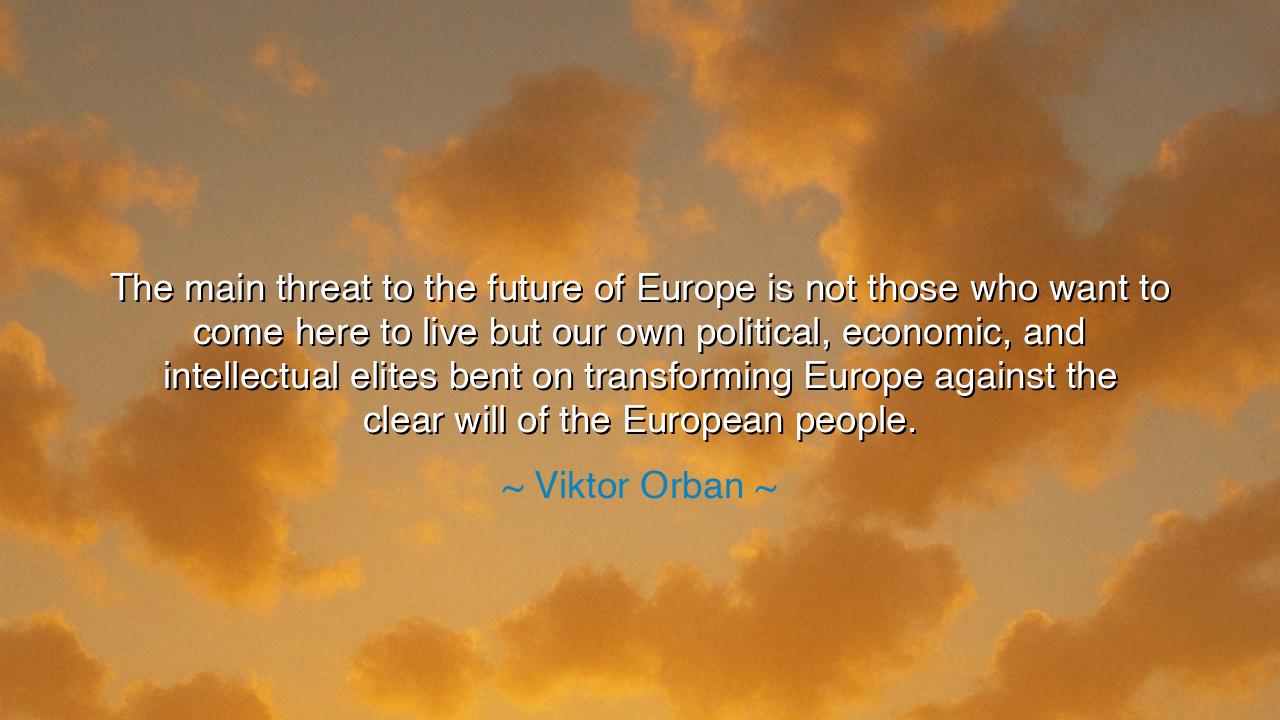
The main threat to the future of Europe is not those who want to
The main threat to the future of Europe is not those who want to come here to live but our own political, economic, and intellectual elites bent on transforming Europe against the clear will of the European people.






In the grand sweep of history, civilizations have always faced the challenge of preserving their identity, values, and future against forces both internal and external. Viktor Orban, in his powerful assertion, "The main threat to the future of Europe is not those who want to come here to live but our own political, economic, and intellectual elites bent on transforming Europe against the clear will of the European people," speaks to the ancient wisdom that societies are not only shaped by those who invade from afar but also by those who seek to alter the course of their own lands for self-serving reasons. His words echo a profound truth: the greatest threat to any society may often lie within, in the hearts of those who hold power but are disconnected from the will of the people.
The ancients understood the importance of unity and civic responsibility in preserving the stability of their societies. In ancient Greece, the philosopher Plato warned in his writings about the dangers of leaders who were more interested in their own interests than in serving the public good. In his work The Republic, he discussed the potential for a tyranny of the elite, where those in power, instead of guiding society in alignment with the will and needs of the people, imposed their own vision on the state. Orban’s words resonate with this same concern—a warning against the disconnection between the elites and the masses, where the ruling class pursues a course that may ultimately undermine the very fabric of society.
Similarly, in Rome, Cicero spoke of the perils of corruption within the ruling class. He believed that the greatest danger to the Roman Republic was not external forces but the moral decay within its leadership. Julius Caesar, a figure who was once seen as a champion of the people, ultimately became a dictator, undermining the principles of the Republic. Cicero, ever the defender of Republican values, warned that the true threat to the freedom of the people came not from foreign invaders, but from leaders who sought to centralize power and act in their own interests. Orban’s statement, then, serves as a modern echo of this ancient wisdom: that elitism—whether in political, economic, or intellectual forms—can be the greatest force against the future of any nation.
In modern history, the events leading to the collapse of the Soviet Union offer another poignant example. Mikhail Gorbachev, the last leader of the Soviet Union, sought to reform the communist system by introducing glasnost and perestroika, but his efforts were often met with resistance from the entrenched elites who had too much to lose. The intellectual and political elites in the Soviet Union had long shaped the direction of the state, often at odds with the desires of the people, and their resistance to reform ultimately led to the unraveling of the system. Orban’s words reflect the danger of an elite that is out of touch with the needs and aspirations of the broader population—history shows us that when these two forces are misaligned, the result can be collapse and disillusionment.
The lesson in Orban’s statement is not one of fear of external threats but a call to vigilance against the insidious dangers of internal corruption and the disconnection between rulers and the people. Leadership, in its truest form, must reflect the will and the needs of the society it serves. The elites, whether in politics, economics, or intellectual spheres, must be guided by a sense of service to the greater good, and not by their own interests. The ancients knew that the health of a society depends on alignment between the people and their leaders, and that when that alignment falters, the society itself begins to unravel.
In practical terms, the lesson from Orban’s words is one of active participation and awareness in shaping the direction of society. Just as the citizens of Athens were directly involved in the decisions of the Athenian Assembly, so too must the people today remain engaged with the political and social systems that affect their lives. This requires not only voting but a commitment to holding leaders accountable, ensuring that those in power are working in the best interests of the public, and not pursuing policies that serve personal or elite agendas. In the same way that Cicero warned of the dangers of a disconnected elite, so must we remain watchful, ensuring that our societies are governed by those who understand and reflect the will of the people.
Let us, therefore, remember the wisdom of the ancients and heed Orban’s caution. The true strength of any nation lies not in the power of the elites, but in the participation and empowerment of its people. Just as Rome fell not due to external invaders but to the decay within, so too must we understand that the greatest threat to the future of Europe—or any society—lies in the hands of those who, in their disconnection from the people, seek to transform it in ways that do not serve its people’s best interests. Let us rise, as citizens of the modern world, to meet the challenges of our time with vigilance, integrity, and a commitment to ensuring that power is always wielded for the common good.






AAdministratorAdministrator
Welcome, honored guests. Please leave a comment, we will respond soon